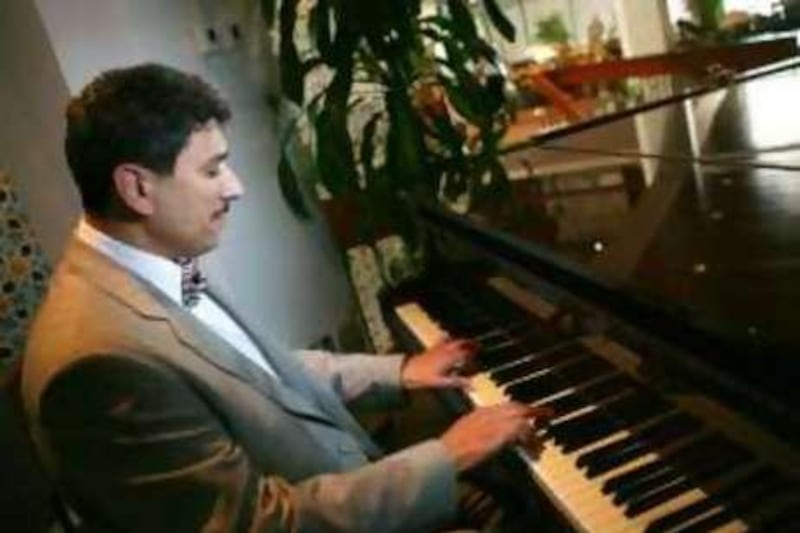Wearing a light suit with his trademark bow tie and trim moustache, the Iraqi piano virtuoso Sultan al Khatib, 44, chuckles with childlike pleasure at his own remarks: "You go somewhere to give a concert, and you end up staying for the rest of your life - maybe." As a music teacher at the Sorbonne Abu Dhabi and the former director of the music department at the Cultural Foundation, Khatib is an active presence on the city's cultural scene. Last April, for example, he presided over the opening of the Taha Hussein Salon, a literary seminar programme ADACH instituted in collaboration with the Egyptian Embassy, giving a recital in honour of his close friend, the Egyptian pianist and composer Omar Khairat. On Jan 14, Khatib is due to perform with a baritone from France at the National Arts Centre.
There is much going on in his life - he is translating musical appreciation books, giving lectures and appearing on television channels, notably Al Jazeera, as well as maintaining a worldwide network of classical music partners - but he never gives the impression of being stressed or in a hurry. When he first arrived in Abu Dhabi to give a National Day concert in 2000, it had been three years since he gave up a remarkable seven-year career popularising classical music in Baghdad. In those years, he headed the Music and Ballet School of Baghdad, where he had started studying under Russians when he was six.
He remembers a nine-year-old student of his, Abbas, with particular fondness. The pair gave a concert in 1999 and Abbas also learned to wear a bow tie. "Before the concert I said to him, 'If you make a mistake, just keep going, don't stop. I'll manage to smooth it out'. And Abbas turned around and said, 'A question, ustaz: what if you make a mistake, what do I do then?'" At the Delma Corner, the cafe on the first floor of the Culutral Foundation where we meet, Khatib's long, streamlined fingers perform a sort of free-form ballet while he talks. Educated at the Bartok Bela Conservatoire and the Franz Liszt Academy, Budapest, Khatib remembers the stark contrast between the wholly mechanical Russian system under which he learnt in Baghdad and the Kodaly system he now encountered, with its stress on experiencing and articulating the melody - and which was to bring out his personality as a performer.
"I will never forget my music teacher saying to me, 'There is a do, and there is a do,' for the first time drawing my attention to the fact that the same note could be played in two entirely different ways." On his return to Iraq, Khatib founded and conducted the National Iraqi Choral Group and appeared on television to tell the stories behind the famous symphonies, operas and ballets. He says he frequently "wept with joy when a taxi driver or a waiter who was a newly converted aficionado" identified him. Finally caving in to the pressure of sanctions and impending war, though never political persecution, Khatib embarked on a sort of extended tour of the Arab world, spending time comfortably in Amman and Tunis but never feeling entirely settled.
Today, Khatib feels so much at home in Abu Dhabi that he could no longer consider leaving - nor does he really need to.
"Baghdad," he declaims, "is no longer even a thought. Other cities might be, but the reason I stay in Abu Dhabi is that I have developed a network of friends and contacts here. I have settled down, and it would be unnecessarily tiring to start over."
But start over he does, every day, as he experiences that most abstract of all art forms as a performer and teacher: "There is no such thing as knowing music. It is something you continually discover, continually invent. By turns I feel like a philosopher, an actor, a painter - and it is the music that allows me to do that."
yrakha@thenational.ae





